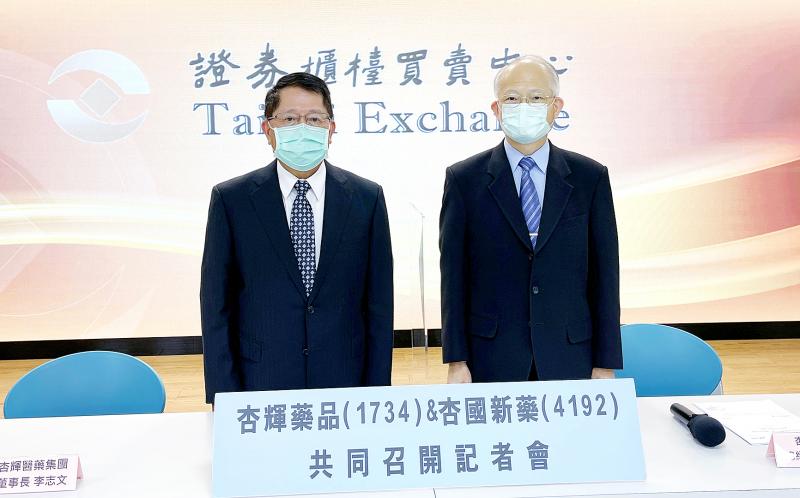The unblinding of phase 3 trial data of SynCore Biotechnology Co Ltd’s (杏國新藥) newly developed pancreatic cancer drug SB05PC showed no statistical significance when compared with the control group, the drugmaker said yesterday.
SB05PC is designed to prolong patients’ lives, and the trial ended once all participants had passed away, the company said.
The trials tested whether people taking the drug would on average live significantly longer than those in the control group, it added.

Photo: CNA
The trials tested for overall survival time — the time the patient survives from the beginning of treatment — and progression-free survival time — the time the patient’s cancer does not worsen from the beginning of treatment, it said.
The median overall survival time for the 108 participants treated with SB05PC was 226 days, while their median progression-free survival time was 113 days.
Meanwhile, the median overall survival time of the 100 patients in the control group was 209 days, while their median progression-free survival time was 110 days, the drugmaker said.
“The difference between the two groups was not statistically significant,” Tim Lee (李志文), chairman of the drugmaker’s parent company Sinphar Pharmaceutical Co Ltd (杏輝醫藥), told a news conference in Taipei.
Other secondary gauges, such as disease control rate, objective response, rate and duration of response also did not show statistical significance, the company said.
The disease control rate averaged 59.38 percent in the treatment group, compared with 48.86 percent in the control group; the objective response rate was 11.46 percent in the treatment group, compared with 6.82 percent in the control group; and response to the drug averaged 4.1 months in the treatment group, compared with 5.6 months in the control group, it said.
SB05PC was developed as a second-line treatment to be combined with chemotherapy drug gemcitabine for patients who do not respond well to first-line drug Folfirinox, SynCore said.
Trail participants either received SB05PC in combination with gemcitabine, or only gemcitabine in the control group, it said.
Although no statistical significance, which would allow SynCore to seek approval for the treatment, was found, the trials were meaningful, as it would base the further development of SB05PC on the results, Lee said.
Phase 3 trials were conducted in seven countries — Taiwan, the US, France, Hungary, Israel, Russia and South Korea — and some populations seemed to react better to the drug, Lee said.
“It was a valuable experience, and we also learned how to be more exact in deciding the development direction of a new drug. This experience is an intangible asset,” Lee said.
SynCore has been developing SB05PC for six years, investing NT$2 billion (US$71.65 million) in the treatment, Lee said, adding that Sinphar funded the project with NT$1.77 billion.
After ending the project, Sinphar is expected to regain profitability, Lee said, aiming to post annual net profit of about NT$400 million.
SynCore reported a net loss of NT$159 million for the first six months of this year, while Sinphar reported net profit of NT$10.34 million, down 71 percent from a year earlier, Sinphar data showed.

South Korea’s equity benchmark yesterday crossed a new milestone just a month after surpassing the once-unthinkable 5,000 mark as surging global memory demand powers the country’s biggest chipmakers. The KOSPI advanced as much as 2.6 percent to a record 6,123, with Samsung Electronics Co and SK Hynix Inc each gaining more than 2 percent. With the benchmark now up 45 percent this year, South Korea’s stock market capitalization has also moved past France’s, following last month’s overtaking of Germany’s. Long overlooked by foreign funds, despite being undervalued, South Korean stocks have now emerged as clear winners in the global market. The so-called “artificial intelligence

NEW IDENTITY: Known for its software, India has expanded into hardware, with its semiconductor industry growing from US$38bn in 2023 to US$45bn to US$50bn India on Saturday inaugurated its first semiconductor assembly and test facility, a milestone in the government’s push to reduce dependence on foreign chipmakers and stake a claim in a sector dominated by China. Indian Prime Minister Narendra Modi opened US firm Micron Technology Inc’s semiconductor assembly, test and packaging unit in his home state of Gujarat, hailing the “dawn of a new era” for India’s technology ambitions. “When young Indians look back in the future, they will see this decade as the turning point in our tech future,” Modi told the event, which was broadcast on his YouTube channel. The plant would convert

‘SEISMIC SHIFT’: The researcher forecast there would be about 1.1 billion mobile shipments this year, down from 1.26 billion the prior year and erasing years of gains The global smartphone market is expected to contract 12.9 percent this year due to the unprecedented memorychip shortage, marking “a crisis like no other,” researcher International Data Corp (IDC) said. The new forecast, a dramatic revision down from earlier estimates, gives the latest accounting of the ongoing memory crunch that is affecting every corner of the electronics industry. The demand for advanced memory to power artificial intelligence (AI) tasks has drained global supply until well into next year and jeopardizes the business model of many smartphone makers. IDC forecast about 1.1 billion mobile shipments this year, down from 1.26 billion the prior

People stand in a Pokemon store in Tokyo on Thursday. One of the world highest-grossing franchises is celebrated its 30th anniversary yesterday.